
Cohen M.F., Wallace J.R. - Radiosity and realistic image synthesis (1995)(en)
.pdf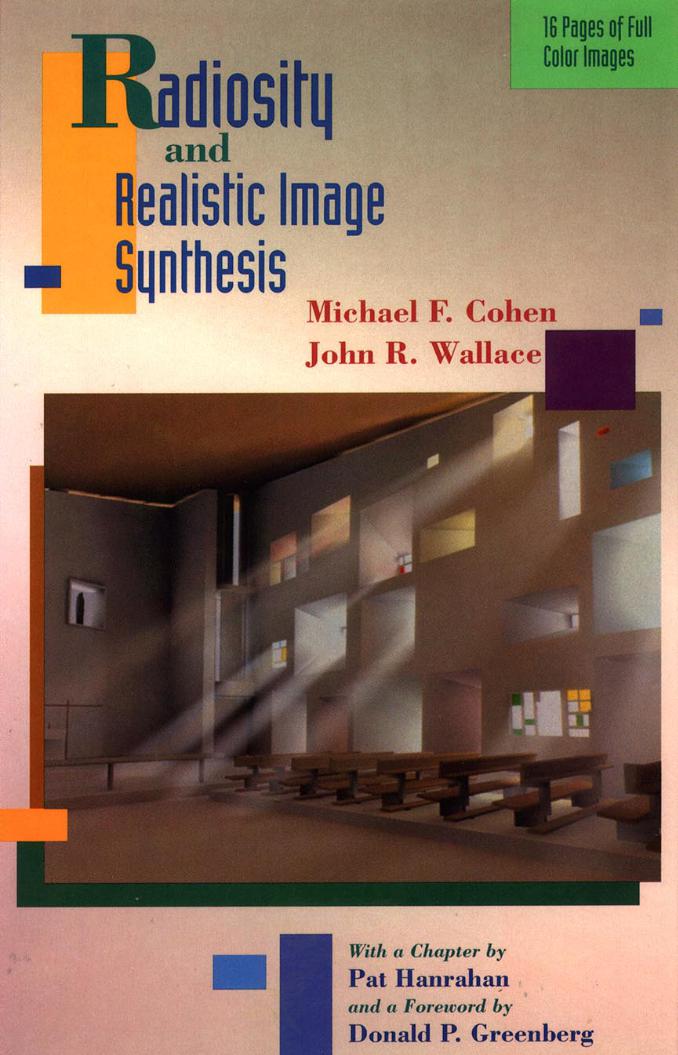
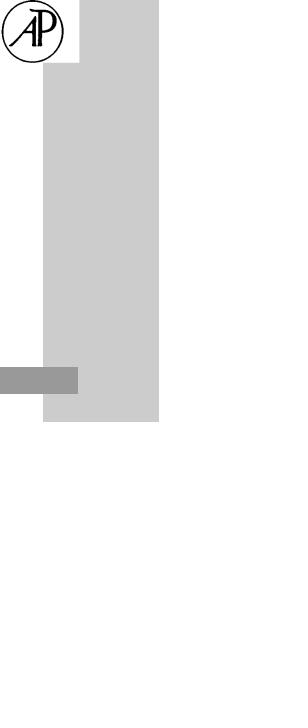
Radiosity and
Realistic Image
Synthesis
Michael F. Cohen
John R. Wallace
Academic Press Professional
Boston San Diago New York
London Syndey Tokyo Toronto
Copyright (c) 1995 by Academic Press, Inc.
GRAPHICS GEMS copyright (c) 1990 by Academic Press, Inc.
GRAPHICS GEMS II copyright (c) 1991 by Academic Press, Inc.
GRAPHICS GEMS III copyright (c) 1992 by Academic Press, Inc.
QUICK REFERENCE TO COMPUTER GRAPHICS TERMS copyright (c) 1993 by Academic Press, Inc.
RADIOSITY AND REALISTIC IMAGE SYNTHESIS copyright (c) 1993 by Academic Press Inc.
VIRTUAL REALITY APPLICATIONS AND EXPLORATIONS copyright (c) 1993 by Academic Press Inc.
All rights reserved.
No part of this product may be reproduced or transmitted in any form or by any means, electronic or mechanical, including input into or storage in any information system, other than for uses specified in the License Agreement, without permission in writing from the publisher.
Except where credited to another source, the C and C++ Code may be used freely to modify or create programs that are for personal use or commercial distribution.
Produced in the United States of America
ISBN 0-12-059756-X
About the cover image:
The cover image shows the interior of Le Corbusier’s Chapel at Ronchamp, France. The illumination was computed using radiosity, with the sunbeams added by stochastic ray tracing during rendering [109, 110]. The model was created by Paul Boudreau, Keith Howie, and Eric Haines at 3D/EYE, Inc. with HewlettPackard’s ARTCore Radiosity and Ray Tracing library.
The image is a frame from the animation The Key is Light presented at the Siggraph ’91 Electronic Theater. The video was produced by Hewlett-Packard Company TV, with extensive help from Becky Naqvi, John Fujii, and Ron Firooz at Hewlett-Packard Company.
The back cover image is a radiosity rendering from a scene of Luther’s Tavern in the Opera Tales of Hoffman. The opera lighting design software used for this image is part of a PhD dissertation by Julie O’Brien Dorsey at Cornell University’s Program of Computer Graphics [73].
Radiosity and Realistic Image Synthesis |
iii |
Edited by Michael F. Cohen and John R. Wallace |
|
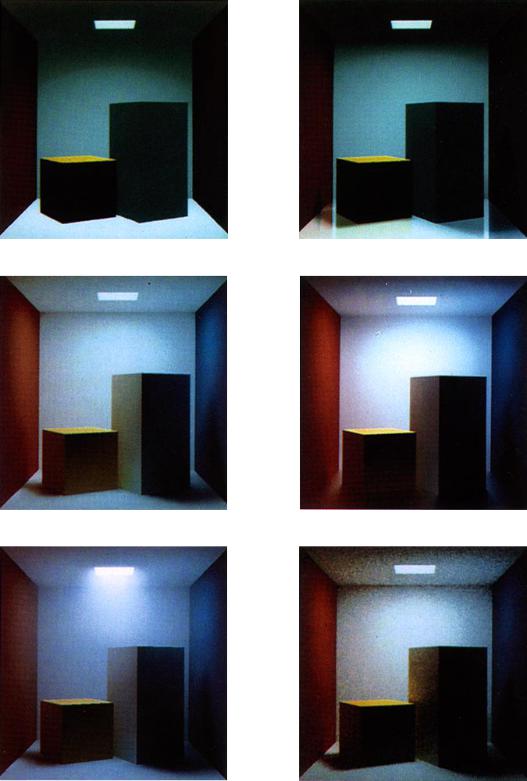
(a) |
(b) |
(c) |
(d) |
(e) |
(f) |
Plate 1. “Six Renderings of Red-Blue Box” (see Chapter 1). (a) Local, (b) Ray Trace, (c) Radiosity, (d) Radiosity + Glossy, (e) Radiosity + Fog, (f) Monte Carlo.
Courtesy of Michael Cohen, Holly Rushmeier, and Ben Trumbore, Program of Computer Graphics, Cornell University.
Radiosity and Realistic Image Synthesis
Edited by Michael F. Cohen and John R. Wallace
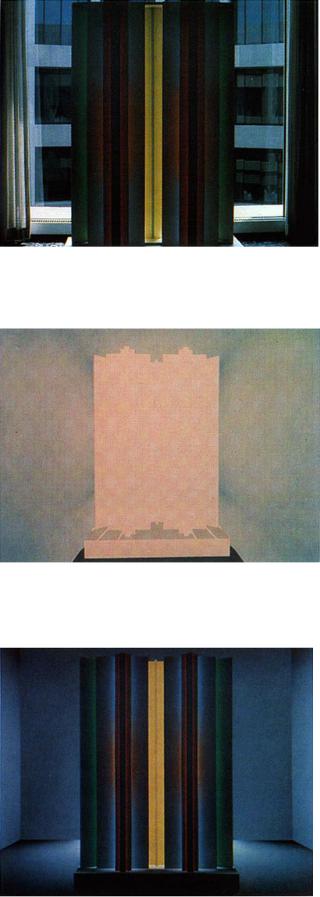
Plate 2. A sculpture by John Ferren entitled “Construction in Wood, A Daylight Experiment.” Front faces of the panels are white. The color is caused by daylight reflected from rear-facing colored surfaces.
Courtesy of Cindy Goral, Program of Computer Graphics, Cornell University.
Plate 3. A ray traced image of the above sculpture. All the panels appear white since a standard ray tracer cannot simulate the interreflection of light between diffuse surfaces.
Courtesy of Cindy Goral, Program of Computer Graphics, Cornell University.
Plate 4. A radiosity image of the above sculpture. Note the color bleeding from the backs of the boards to the fronts.
Courtesy of Cindy Goral, Program of Computer Graphics, Cornell University.
Radiosity and Realistic Image Synthesis
Edited by Michael F. Cohen and John R. Wallace
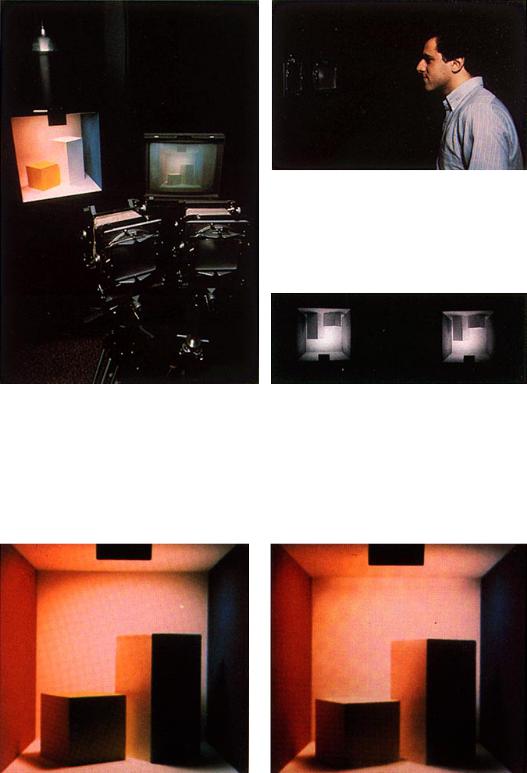
Plate 5. Experimental setup to test accuracy of radiosity method and choice of color spaces. Courtesy of Gary Meyer, Program of Computer Graphics, Cornell University.
Plate 8. Photograph of real scene taken with portrait camera. (Color adjusted for film and monitor gamuts in Plates 8 and 9.) Courtesy of Gary Meyer, Program of Computer Graphics, Cornell University.
Plate 6. Observer viewing images projected onto frosted glass in portrait cameras. Courtesy of Gary Meyer, Program of Computer Graphics, Cornell University.
Plate 7. Upside down views as seen by observer. Courtesy of Gary Meyer, Program of Computer Graphics, Cornell University.
Plate 9. Photograph of CRT screen containing radiosity image. Courtesy of Gary Meyer, Program of Computer Graphics, Cornell University.
Radiosity and Realistic Image Synthesis
Edited by Michael F. Cohen and John R. Wallace

Plate 10. “Magritte Studio.” Radiosity with texture mapping of both reflecting surfaces and light sources. Courtesy of Michael Cohen, Program of Computer Graphics, Cornell University.
Plate 11. “Computer Room.” Shading using direct illumination only.
Courtesy of Tamoyuki Nishita, Fukuyama University.
Plate 12. “Auditorium.” An element mesh in which “T” vertices have been eliminated by triangulation to create conforming elements.
Courtesy of Daniel Baum, Silicon Graphics Corporation.
Radiosity and Realistic Image Synthesis
Edited by Michael F. Cohen and John R. Wallace
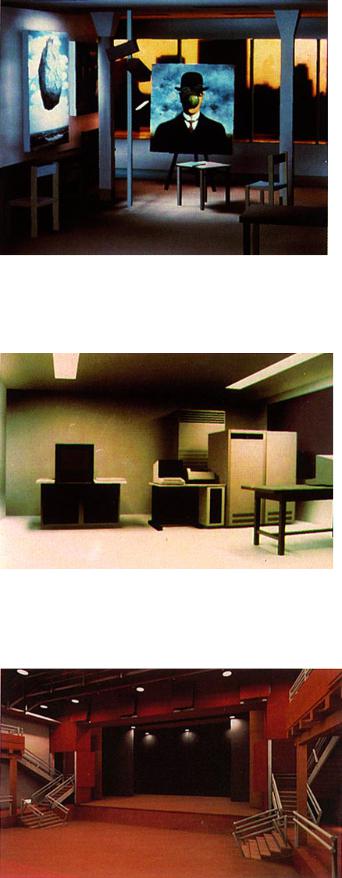
Plate 13. “Magritte Studio, Lights Off.” Image created using the same form factors as plate 10. Turning off light requires only resolving the matrix equation with new emission values.
Courtesy of Michael Cohen, Program of Computer Graphics, Cornell University.
Plate 14. “ Computer Room.” The same environment as in Plate 11, with radiosity used to compute both direct and indirect illumination. Note the additional illumination on the ceiling. Courtesy of Tamoyuki Nishita,
Plate 15. The same image as in Plate 12 with out displaying the mesh. Courtesy of Daniel Baum, Silicon Graphics Corporation.
Radiosity and Realistic Image Synthesis
Edited by Michael F. Cohen and John R. Wallace

Plate 16. “Steel Mill.” A complex environment shaded using progressive refinement radiosity. Courtesy of John Wallace and Stuart Feldman, Program of Computer Graphics, Cornell University.
Plate 17. “Constuctivist Museum.” The complex interreflection from the ceiling baffles was simulated with the progressive refinement approach. Courtesy of Shenchang Chen, Stuart Feldman, and Julie O’Brien Dorsey, Program of Computer Graphics, Cornell University.
Radiosity and Realistic Image Synthesis
Edited by Michael F. Cohen and John R. Wallace
